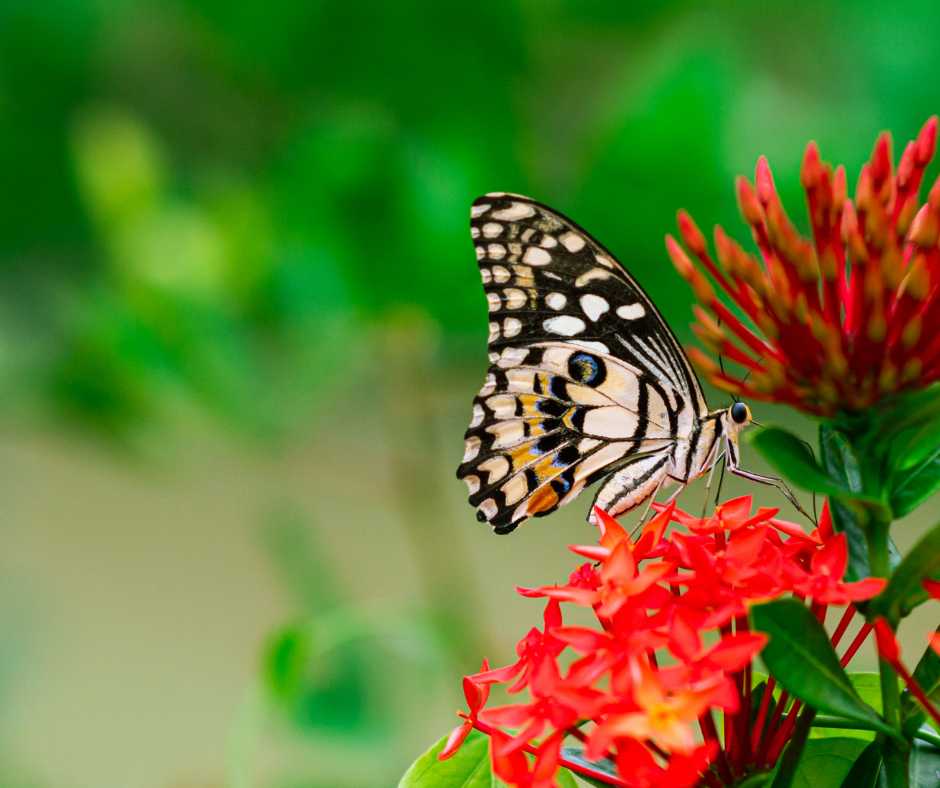Color flutters into our coastal community on the wings of the American Snout, Grey Hairstreak, Comma and Question Mark. Wait…the what? With over 150 species of butterflies native to our region there are odd names galore and plenty of interesting facts to explore. SO here’s a beginner’s look at butterflies and their importance in Sussex.
Starting with the area’s perennial favorite, the Monarch butterfly. Cheering up gardens ever, it’s easily spotted for its regal size and orange and black double wings. These popular beauties are known for their 3,000-mile migration each year from central Mexico to Canada and back! They travel up the “Atlantic Flyway,” and the Delaware coast is smack in the middle of that trip. Those that arrive from Mexico by mid-June on their way towards Canada are usually second generation. Then those we see in abundance in September are usually a fourth generation, fueling themselves on nectar on a stopover before returning to Mexico.



Naturalists often call the butterfly “the great ambassador” for teaching people about insects and ecosystems. They are attractive and do not evoke fear, as many other insects are prone to do. However, their population is in decline, according to Monarch Watch, an organization dedicated to studying, tagging and counting Monarchs up and down the east coast.
On the other end of the spectrum from the monarch is the most commonly seen ‘Cabbage White’, often misunderstood as a moth. (One way to distinguish between a moth and a butterfly: butterflies are active only in daylight, while moths are nocturnal.) With so many species native to our area, butterfly-watching might be just the new hobby you were looking for.
However, these pollinators can sometimes be treated like pests although , like bees and beetles, they are vitally important to the health of area plants and other wildlife, and are great predictors of our local environment’s stability.
Butterflies rely on native plants; a caterpillar, after all, cannot evolve into a butterfly, unless it finds a home on an appropriate plant, such as our area’s native milkweed, bergamot or goldenrod. Caterpillars consume buds and leaves, while butterflies need nectar. Milkweed varieties native to Delaware are in particular essential for the survival of the monarch butterfly population. Unfortunately, is considered by many people to be an unattractive and toxic weed, and is often destroyed with suburban development or herbicides. As you consider your own garden, also consider how invasive species of plants in our area can severely damage our
fragile local ecosystem, according to a report from the University of Delaware.
There are other ways to enjoy and attract butterflies to your garden, however, while contributing to our area’s biodiversity and fragile ecosystem. Delaware’s Center for Inland Bays recommends mountain mints, wild bergamot, goldenrods and asters among others. Its web site lists local resources for purchasing these and other native plants crucial to pollinators. The Delaware Nature Society also has an annual native plant sale every spring. Knowing the botanical name of the plants you are looking for is helpful when shopping. So plan that butterfly garden you’ve also dreamed of now that you have time to get outside and enjoy! You’ll not just treasure the beauty, but you’ll know you are helping beautiful and crucial butterflies this summer.
Enjoyed the article and enjoy the butterflies. Please do an article on lady bugs and praying mantis. I used to alternate buying lady bugs and the following year praying mantis eggs and/or bugs. Don’t know where a person can find these around here but they used to sell them at my local nursery.
Right here is the perfect webpage for everyone who would like to understand this topic. You understand a whole lot its almost tough to argue with you (not that I really will need toÖHaHa). You certainly put a fresh spin on a subject that has been discussed for a long time. Wonderful stuff, just excellent!
Thank you for another wonderful post. Where else could anyone get that type of info in such an ideal way of writing? I’ve a presentation next week, and I’m on the look for such info.